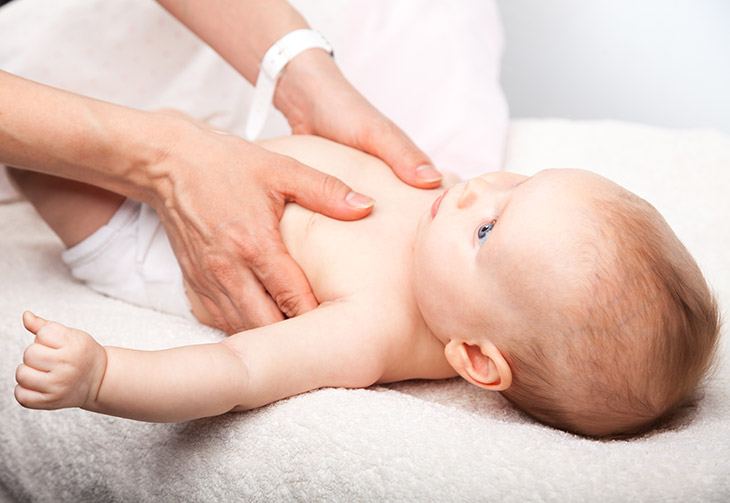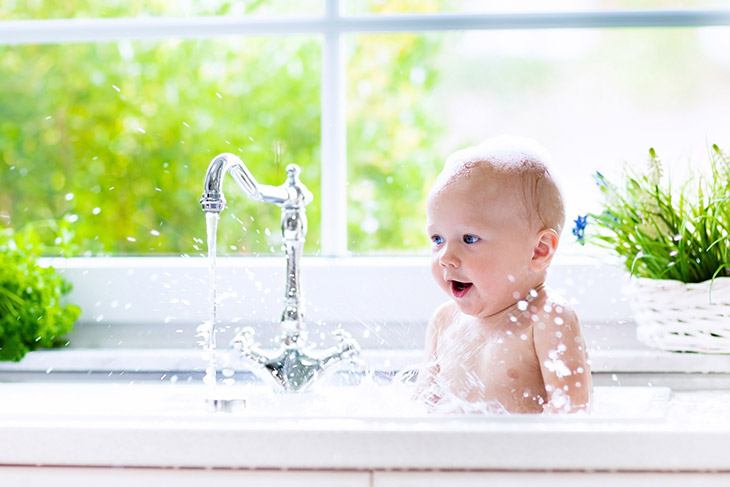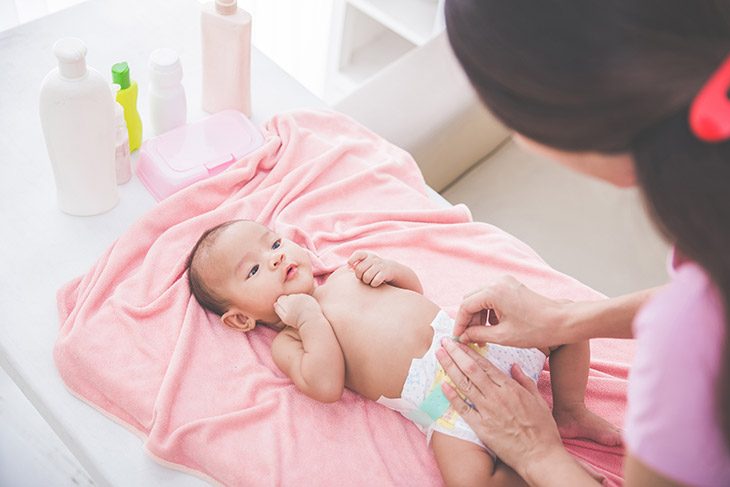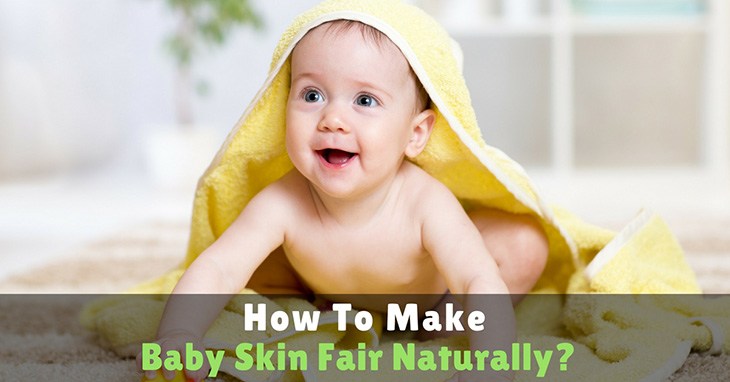How To Make Baby Skin Fair Naturally?
Motherhood is one of the joyous phases of a woman’s life. When you become a mother, your priorities will change, and you will be putting your baby’s welfare first before other things.
One of the things that most parents wish is for their baby to have fair skin. There are various ways on how to make your child’s skin fair. You have to follow a few basic steps to ensure that your child’s skin remains healthy and glowing.
More...
Things You Need To Know About Baby’s Skin

When a baby is born, his or her skin will tend to be weird at first, especially if the baby is born prematurely. Immediately after birth, you will notice that your child’s skin is covered with fine hair called lanugo or a cheese-like substance called vernix.
In the first few days, your child’s complexion will be reddish purple as your child’s circulatory system speeds up, regardless of ethnicity.
Aside from being hairy and greasy, your baby’s skin will probably be blemished, blotchy and bumpy. Some babies have white or yellow spots that appear like tiny whiteheads all over their faces. Not just that, a baby’s skin is also prone to developing rashes.
You also have to remember that your child’s skin is ultra thin and extra-sensitive. Thin skin makes babies more likely to be chilled. After a year, your baby’s skin will thicken enough for him or her to become naturally insulated.
Skin Conditions That Can Affect Your Baby’s Skin
Baby skin is considered more active compared to adult skin, as it is continuing to develop. Likewise, baby skin is more vulnerable to changes in humidity, temperature and other elements that can irritate the skin. For this reason, it is important to always protect your baby’s skin against environmental changes and harsh skin care products.
Your baby’s skin is considered as his or her first line of defense from the outside world. To keep it healthy, there are various ways that you can do. But before learning about these ways, it is vital to know the skin conditions that can affect your baby’s skin.
1. Dry Skin
One of the most common conditions affecting your baby’s skin is dry skin. Your baby’s skin is more delicate, making it more susceptible to becoming dry and irritated.
Cold and dry outdoor air as well as indoor heating can actually rob the skin of its natural moisture, especially during winter. If your baby’s skin is dry, there is a tendency that he or she will develop dry patches because of air conditioning and sun exposure.
2. Baby Acne And Milia
This condition is quite common. This can be present at birth but also appears several weeks after birth.
Baby acne looks similar to teenage acne. It may appear white or red bumps surrounded by reddish skin. This becomes more pronounced when your baby is fussy or hot. Also, this condition may be aggravated when your baby’s skin comes in contact with spit up milk, saliva, and rough fabric.
Not all blemishes on your baby’s skin are considered acne, as your baby can also have milia. Milia are a white and tiny bump that are present at birth and disappears several weeks after birth.
[Read: 5 Exclusive Home Remedies For Baby Acne That Will Make You Go Wow]
3. Eczema

Atopic dermatitis or eczema is another skin condition that can affect your baby’s skin. This is a type of skin rash that appears before your child turns five years old.
This rash usually appears on the scalp and cheeks. However, it can also spread to the chest, arms, legs and other parts of the body.
Eczema appears to be dry, scaly and thickened skin. In other cases, it appears as tiny red bumps that become infected when scratched.
While this condition is not contagious, it is very itchy and uncomfortable for your child. If you suspect that you’re your child has them, you should consult with your baby’s pediatrician.
While there is no determined cause for this condition, it is noted that this condition is possibly hereditary. Also, this condition is not an allergic reaction to any substance. However, allergens, heat and other irritants can trigger and aggravate the rash.
4. Ringworm
Ringworm is a contagious fungal infection of the skin. Despite its name, this condition has nothing to do with worms. This skin condition can be itchy and uncomfortable but not painful.
This skin condition appears as a scaly patch which measures about the size of a dime or a quarter. The patches do not necessarily start out round. Eventually, the patches will form a scaly ring around a smooth center.
The rash can also come out dry or moist and appear in almost anywhere on the body.
Ways On How To Make Baby Skin Fair Naturally
There are several ways that can contribute to making your baby’s skin healthy and fair naturally.
1. Choose Safe And Natural Baby Products
One of the best ways to care for your baby’s skin and make it fair naturally is to make use of safe and natural baby products.
You need to scan the product’s label and opt for those products that do not contain parabens, fragrances, and formaldehyde, as these ingredients can be irritating.
When choosing a cleanser, you should opt for soap-free liquids. For shampoos, you should go for those formulations that are not irritating to the eyes.
If possible, you should skip using baby wipes altogether or use the alcohol-free ones. The safest option, however, is to make use of damp washcloth.
2. Bathe Your Baby When Necessary

There is no need to bathe your baby every day, at least until your baby starts stomping through puddles of mud or rubbing food in his or her hair. In fact, your baby only needs three to four baths every week.
Too much bathing can dry and irritate your baby’s skin, making him or her more susceptible to infections and rashes. In some days, a quick wipe down of your baby’s neck, arms, legs, and diaper area using a damp washcloth is already enough.
You should consider using fragrance-free cleansers. Also, you should use a clean, damp washcloth in bathing your baby and make sure that you focus on creases like the neck, armpits, knees, toes and genitals.
3. The Right Bathing Technique
When bathing your baby, you have to make sure that you are doing it correctly. The water temperature should not be too hot or cold, as this can irritate your baby’s skin.
It is always ideal to use lukewarm bath water. You should test the water before bathing your baby.
When bathing your baby, you should fill a towel-lined baby tub or just the sink with two inches of plain water. You should not fill this with soapy water as it can dry out the skin. You should also avoid using bath oils.
4. Change Diapers Often

Most diaper rash incidents occur when babies sit in dirty diapers for extended periods of time. Ideally, you should change your baby’s diaper every three hours. However, if your baby’s diaper becomes soiled, change it right away.
You can make use of a diaper cream every time you change your baby’s diaper, as this can prevent chafing. Also, if your baby’s skin is extra-sensitive, you should opt for disposable diapers, as they dry out fast compared to cloth ones.
5. Use Moisturizers When Necessary
To make your baby’s skin naturally fair, you should make use of moisturizers every day. In choosing your baby’s moisturizer, you have to ensure that it does not contain dyes or fragrances, as they can be irritating to your baby’s skin.
If your baby’s skin is super dry, you can apply moisturizers twice a day. You should not only use the moisturizer on dry spots, as babies tend to move around a lot. Instead, you should rub the moisturizer all over your baby’s body.
6. Reduce Sun Exposure
Exposures to the sun’s harmful ultraviolet rays can increase the risk of skin cancer, especially in infants, whose skin still has less pigment for protection.
For the first six months of your baby’s life, you should avoid any exposure to the sun, especially during those times when the sun is strongest.
If you need to go out, you have to take precautions and use an umbrella or stroller shade to avoid direct sunlight exposure. Also, you can dress your baby in pants and long sleeves and use wide-brimmed hats to cover your baby’s head.
It is possible to use and apply sunscreen even for the youngest babies. However, you should always check the product label and make sure that it is safe for babies.
Also, you should be careful in applying the sunscreen around the eyes and mouth. You can reapply it every two hours or whenever your baby gets wet.
7. Keep Your Baby Hydrated All The Time
You should always make sure that your baby is well-hydrated. Dehydration can cause skin dryness, which often leads to skin irritation. Dehydration can also lead to some health complications.
Conclusion
Your baby’s skin is very sensitive and can easily become irritated. To keep it healthy and fair, you should follow the safe and natural ways to care for your baby’s skin.
At the end of the day, it is always about giving more love and care for your precious little one. You should not overdo and carefully choose the steps that will allow your baby’s skin to become healthy and fair.


